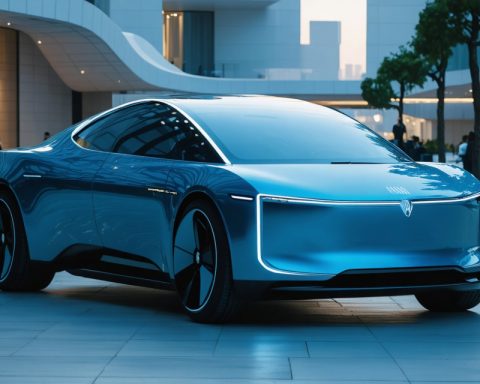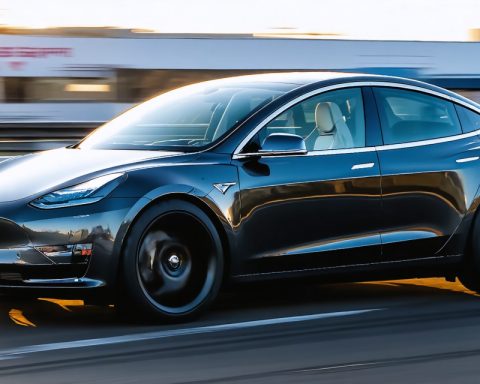- Tesla’s sales are plummeting in key European markets, with significant declines in Germany (60%), France (44%), and Norway (45%) in recent months.
- Elon Musk’s public persona and political stances may be negatively affecting Tesla’s brand perception among European consumers.
- The anticipation around the new Model Y has kept potential buyers in a waiting pattern, exacerbating current sales issues.
- Despite Tesla’s struggles, overall electric vehicle demand in Europe remains robust, as seen in Norway’s 21% increase in EV sales.
- Increasing competition from emerging electric vehicle manufacturers in Europe challenges Tesla’s market dominance.
- Tesla needs to innovate and adapt culturally to recover its former market position and avoid becoming a cautionary tale in the electric vehicle sector.
The roads of Europe, once proudly traversed by sleek Teslas, are witnessing a conspicuous decline in the iconic electric vehicles. In February alone, Tesla faced a significant downturn in sales across key European markets, reflecting a trend that has accelerated sharply in 2025.
Glimpses of the struggle can be seen in the vibrant cityscapes of Germany, the UK, France, and beyond. These nations, known for their robust automotive enthusiasm, reported sales figures that could hardly be called encouraging. In Germany, sales plummeted by nearly 60%, while France recorded a staggering 44% drop. Even the eco-conscious haven of Norway, where electric vehicles reign, saw Tesla sales fall by 45% year-over-year.
European consumers, it seems, are beginning to look beyond the allure of Tesla. The electric vehicle pioneer faces multiple hurdles, not least of which is the public persona of its CEO, Elon Musk. His vocal political stances have not always resonated well with the wider European audience, possibly impacting consumer sentiment.
Adding to Tesla’s woes is the much-anticipated rollout of the new Model Y. The promise of a redesigned powerhouse on wheels has kept potential buyers waiting, their patience perhaps wearing thin. Yet, this isn’t the first time Tesla has played the waiting game; a similar strategy with the Model 3 failed to stymie the sales decline last year. Competition, too, sharpens its teeth. The European market teems with up-and-coming electric vehicles, giving the discerning buyer much to consider.
Despite reduced incentives in some areas, the appetite for electric vehicles remains robust throughout the continent. Norway, for instance, experienced an overall increase in electric car sales by 21% in February, unmistakably signaling an ongoing green revolution—but Tesla’s flagging numbers tell a different story.
For Tesla, the message is clear and inescapable: this isn’t merely a hiccup. A profound shift is necessary to reclaim its position as the titan of European EVs. As March promises the anticipated new Model Y deliveries, the company must craft a strategy to address these challenges—one that marries innovation with cultural sensitivity. As the world watches the roads of Europe, Tesla’s next steps will determine whether it stays as a leader in the electric revolution or becomes a cautionary tale of unmet potential.
Why Tesla is Losing Ground in Europe: Surprising Insights and Future Predictions
Understanding Tesla’s Decline in Europe
Tesla, once the frontrunner in the electric vehicle (EV) market, is witnessing a significant sales decline across Europe. Here are some deeper insights into this trend and potential future directions:
Key Factors Behind the Decline
1. Intense Competition:
European car manufacturers like Volkswagen, BMW, and Mercedes-Benz have ramped up their EV offerings. These competitors cater more closely to regional tastes and often come with a legacy of trust and reliability in these markets. The VW ID.3 and ID.4, for example, are increasingly popular, presenting formidable alternatives to Tesla’s lineup.
2. Consumer Perception Challenges:
While Elon Musk is a celebrated figure in tech circles, his controversial political statements have been polarizing in Europe. This has affected the brand’s perception, particularly in countries that value political neutrality in corporate leaders.
3. Market-Specific Needs:
European consumers often prioritize smaller, more efficient cars suitable for city driving. Tesla’s larger vehicles may not align with this preference. Additionally, European car buyers are sensitive to driving ranges and local charging infrastructure, where Tesla may lag in specific regions compared to competitors.
4. Supply Chain Issues:
The global semiconductor shortage and logistical delays have impacted deliveries, frustrating eager buyers waiting for the new Model Y.
Market Trends and Industry Forecasts
– The demand for eco-friendly transportation in Europe continues to grow. The European Union’s Green Deal aims to transition away from fossil fuels, setting strict CO2 emissions targets that benefit EVs. Despite Tesla’s current struggles, the EV market is projected to grow by over 25% annually over the next few years in Europe, according to the International Energy Agency (IEA).
– Consumers are also increasingly interested in sustainable production practices. European companies often market their cars with an emphasis on ethical labor practices and minimal carbon footprints, which resonate well with European consumers.
Pros and Cons of Tesla in Europe
Pros:
– Strong Brand Identity: Tesla is synonymous with innovation and cutting-edge technology.
– Supercharger Network: Despite competition in home markets, Tesla’s Supercharger network remains one of the most extensive and reliable in Europe.
– Autonomous Driving Capability: Tesla’s advanced driver-assistance systems are ahead of many competitors.
Cons:
– Price Point: Teslas are often more expensive than local European brands, which can be a deterrent.
– CEO Controversies: Public perceptions about Elon Musk can negatively affect the brand.
– Delayed Deliveries: Regular delays in delivering new models like the Model Y dilute customer excitement and loyalty.
Actionable Recommendations
– Tailor Marketing Strategies: Tesla needs to reshape its European marketing strategies to resonate more with local cultures and values. Highlighting environmental benefits, safety features, and technological advancements could enhance Tesla’s appeal.
– Enhance Local Engagement: Greater engagement with European stakeholders, including governments and local businesses, could help Tesla align its products with regional needs.
– Expand and Modernize Infrastructure: Continued investment in the Supercharger network and partnerships with local companies for charging solutions can facilitate quicker adoption of Tesla vehicles.
Life Hacks for Potential Tesla Buyers
– Research Incentives: Various countries in Europe offer subsidies and tax incentives for purchasing EVs. Understanding these can reduce overall costs significantly.
– Leverage Charging Networks: Potential buyers should evaluate their access to charging stations. Tesla Superchargers provide fast and reliable charging, but it’s wise to map out these facilities within your usual driving routes.
For more insights on sustainable car options, visit the Tesla site to explore their vehicles and innovations shaping the future of transportation.
Conclusion
Tesla’s journey in Europe underscores the intricate balance between innovation and localization. By addressing market-specific needs and refining their approach, Tesla can regain its momentum in the European landscape. For now, potential buyers should weigh their options carefully by considering all factors, including brand reputation, vehicle features, and market realities.


















